"When I started working on the book in earnest this year, I thought it would be about how we lost our way in dialogue, but eventually I learned that using creativity and commitment, we could indeed have the hardest conversation. And the world needed to see that. People needed to know it was still possible." —Fred Dust
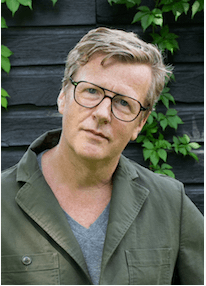
Fred Dust, Esalen faculty and Former Senior Partner of IDEO, was not immune to adjusting personally and professionally this year as the pandemic captured the global spotlight. In fact, it inspired him to write a new book, Making Conversation: Seven Essential Elements of Meaningful Communication, which will be released Dec. 1.
In it, Fred culls from his lifelong experiences and has given birth to a remarkable resource for people to become more deliberate and purposeful in making conversations work.
“It’s easy with this pandemic to be always on,” Fred says. “But there’s a lot that makes this especially dangerous for our emotional health. Pause, mourn, celebrate even, but don’t hand yourself over to the machine, any machine. We can still make creative conversations, even when we're far from one another.”
Fred used 2020’s shelter-in-place measures as a springboard for deep creation and wrote several of the principles found in his book in just an hour. “We’ve been using them now [predominantly online] to guide our way for the last eight months,” he says, “and the conversation has been amazing, just, inclusive, even exuberant.”
Fred admits that the genesis of the book actually began when his mother had a stroke several years ago. The stoke left her aphasic and Fred began to realize that listening—truly listening to someone—is real work.
“Then came the last election and the increased divide in America,” he adds. “Back when I started working on it in earnest this year, I thought it would be about how we lost our way in dialogue, but eventually I learned that using creativity and commitment, we could indeed have the hardest conversation. And the world needed to see that. People needed to know it was still possible.”
Fred spent many years brokering communication between colleagues and clients, particularly at IDEO. He believed there had to be a way to design the art of conversation itself with intention and purpose, but also invite it to be artful and playful.
One of the more memorable sections in the book highlights five principles for making conversations online, which are outlined below:
When asked if there was one main principle that typically goes overlooked when it comes to making conversations in the virtual world, Fred points to No. 5: Design Humans In.
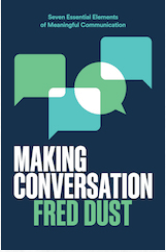
“Too often nowadays, we forget to make way for humanity in our conversations,” he explains. “But course-correction can sometimes come from the smallest gestures. For instance, sometimes I’ll pretend I’m a little more forgetful than I am, so I can call on an individual who isn’t being ‘seen’ in a Zoom call and ask them to help me out. At the Rockefeller Foundation we’ll often design in these randomized two-people coffee chats as little breaks. I was just in one with a global leader and a Nigerian entrepreneur that was so gracious, supportive and humanizing.”
In a year where a pandemic and racial injustice took center stage, Fred sees one thing as being most vital now, in terms of people making real connection: “Go hardest first,” he shares. “Start with love!”
But he is quick to add that this is the perfect time ask ourselves: "Where can I help and where am I not helpful?"
“If you know you're not going to be helpful, remove yourself from those conversations,” Fred says. “There's real power in not participating, bowing out, stepping back. You’ll make the conversations you're not in better and you’ll make time in life for the conversations that matter most to you.”
To lean more about Fred Dust’s work or to order his book, click here.


“Remembering to be as self compassionate as I can and praying to the divine that we're all a part of.”
–Aaron
“Prayer, reading, meditation, walking.”
–Karen
“Erratically — which is an ongoing stream of practice to find peace.”
–Charles
“Try on a daily basis to be kind to myself and to realize that making mistakes is a part of the human condition. Learning from our mistakes is a journey. But it starts with compassion and caring. First for oneself.”
–Steve
“Physically: aerobic exercise, volleyball, ice hockey, cycling, sailing. Emotionally: unfortunately I have to work to ‘not care’ about people or situations which may end painfully. Along the lines of ‘attachment is the source of suffering’, so best to avoid it or limit its scope. Sad though because it could also be the source of great joy. Is it worth the risk?“
–Rainer
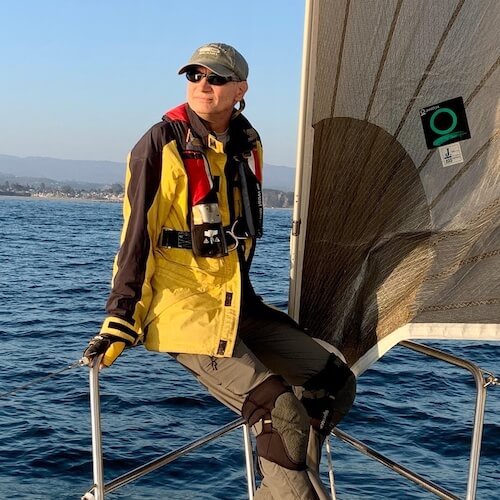

“It's time for my heart to be nurtured on one level yet contained on another. To go easy on me and to allow my feelings to be validated, not judged harshly. On the other hand, to let the heart rule with equanimity and not lead the mind and body around like a master.”
–Suzanne
“I spend time thinking of everything I am grateful for, and I try to develop my ability to express compassion for myself and others without reservation. I take time to do the things I need to do to keep myself healthy and happy. This includes taking experiential workshops, fostering relationships, and participating within groups which have a similar interest to become a more compassionate and fulfilled being.“
–Peter
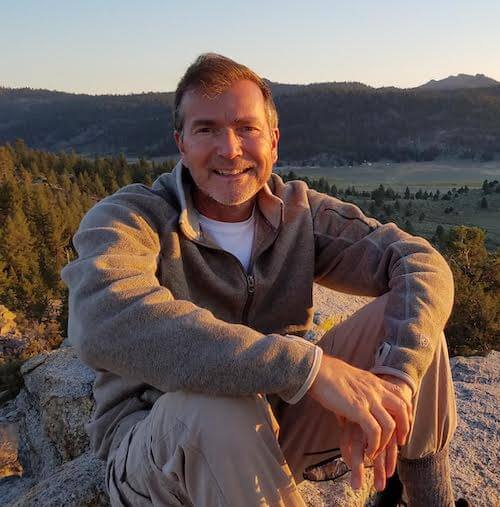
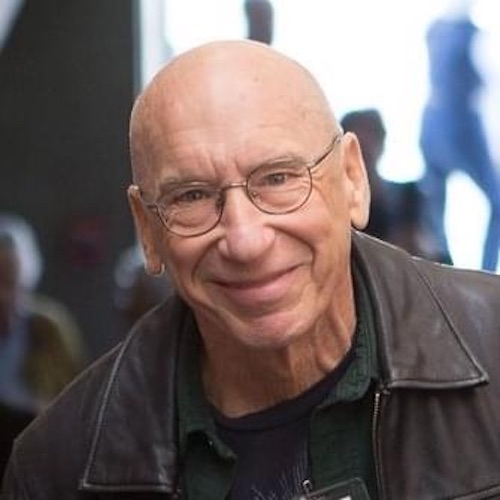
“Self-forgiveness for my own judgments. And oh yeah, coming to Esalen.”
–David B.
“Hmm, this is a tough one! I guess I take care of my heart through fostering relationships with people I feel connected to. Spending quality time with them (whether we're on the phone, through messages/letters, on Zoom, or in-person). Being there for them, listening to them, sharing what's going on with me, my struggles and my successes... like we do in the Esalen weekly Friends of Esalen Zoom sessions!”
–Lori

“I remind myself in many ways of the fact that " Love is all there is!" LOVE is the prize and this one precious life is the stage we get to learn our lessons. I get out into nature, hike, camp, river kayak, fly fish, garden, I create, I dance (not enough!), and I remain grateful for each day, each breath, each moment. Being in the moment, awake, and remembering the gift of life and my feeling of gratitude for all of creation.”
–Steven
“My physical heart by limiting stress and eating a heart-healthy diet. My emotional heart by staying in love with the world and by knowing that all disappointment and loss will pass.“
–David Z.
Today, September 29, is World Heart Day. Strike up a conversation with your own heart and as you feel comfortable, encourage others to do the same. As part of our own transformations and self-care, we sometimes ask for others to illuminate and enliven our hearts or speak our love language.
What if we could do this for ourselves too, even if just for today… or to start a heart practice, forever?
"When I started working on the book in earnest this year, I thought it would be about how we lost our way in dialogue, but eventually I learned that using creativity and commitment, we could indeed have the hardest conversation. And the world needed to see that. People needed to know it was still possible." —Fred Dust

Fred Dust, Esalen faculty and Former Senior Partner of IDEO, was not immune to adjusting personally and professionally this year as the pandemic captured the global spotlight. In fact, it inspired him to write a new book, Making Conversation: Seven Essential Elements of Meaningful Communication, which will be released Dec. 1.
In it, Fred culls from his lifelong experiences and has given birth to a remarkable resource for people to become more deliberate and purposeful in making conversations work.
“It’s easy with this pandemic to be always on,” Fred says. “But there’s a lot that makes this especially dangerous for our emotional health. Pause, mourn, celebrate even, but don’t hand yourself over to the machine, any machine. We can still make creative conversations, even when we're far from one another.”
Fred used 2020’s shelter-in-place measures as a springboard for deep creation and wrote several of the principles found in his book in just an hour. “We’ve been using them now [predominantly online] to guide our way for the last eight months,” he says, “and the conversation has been amazing, just, inclusive, even exuberant.”
Fred admits that the genesis of the book actually began when his mother had a stroke several years ago. The stoke left her aphasic and Fred began to realize that listening—truly listening to someone—is real work.
“Then came the last election and the increased divide in America,” he adds. “Back when I started working on it in earnest this year, I thought it would be about how we lost our way in dialogue, but eventually I learned that using creativity and commitment, we could indeed have the hardest conversation. And the world needed to see that. People needed to know it was still possible.”
Fred spent many years brokering communication between colleagues and clients, particularly at IDEO. He believed there had to be a way to design the art of conversation itself with intention and purpose, but also invite it to be artful and playful.
One of the more memorable sections in the book highlights five principles for making conversations online, which are outlined below:
When asked if there was one main principle that typically goes overlooked when it comes to making conversations in the virtual world, Fred points to No. 5: Design Humans In.

“Too often nowadays, we forget to make way for humanity in our conversations,” he explains. “But course-correction can sometimes come from the smallest gestures. For instance, sometimes I’ll pretend I’m a little more forgetful than I am, so I can call on an individual who isn’t being ‘seen’ in a Zoom call and ask them to help me out. At the Rockefeller Foundation we’ll often design in these randomized two-people coffee chats as little breaks. I was just in one with a global leader and a Nigerian entrepreneur that was so gracious, supportive and humanizing.”
In a year where a pandemic and racial injustice took center stage, Fred sees one thing as being most vital now, in terms of people making real connection: “Go hardest first,” he shares. “Start with love!”
But he is quick to add that this is the perfect time ask ourselves: "Where can I help and where am I not helpful?"
“If you know you're not going to be helpful, remove yourself from those conversations,” Fred says. “There's real power in not participating, bowing out, stepping back. You’ll make the conversations you're not in better and you’ll make time in life for the conversations that matter most to you.”
To lean more about Fred Dust’s work or to order his book, click here.


“Remembering to be as self compassionate as I can and praying to the divine that we're all a part of.”
–Aaron
“Prayer, reading, meditation, walking.”
–Karen
“Erratically — which is an ongoing stream of practice to find peace.”
–Charles
“Try on a daily basis to be kind to myself and to realize that making mistakes is a part of the human condition. Learning from our mistakes is a journey. But it starts with compassion and caring. First for oneself.”
–Steve
“Physically: aerobic exercise, volleyball, ice hockey, cycling, sailing. Emotionally: unfortunately I have to work to ‘not care’ about people or situations which may end painfully. Along the lines of ‘attachment is the source of suffering’, so best to avoid it or limit its scope. Sad though because it could also be the source of great joy. Is it worth the risk?“
–Rainer


“It's time for my heart to be nurtured on one level yet contained on another. To go easy on me and to allow my feelings to be validated, not judged harshly. On the other hand, to let the heart rule with equanimity and not lead the mind and body around like a master.”
–Suzanne
“I spend time thinking of everything I am grateful for, and I try to develop my ability to express compassion for myself and others without reservation. I take time to do the things I need to do to keep myself healthy and happy. This includes taking experiential workshops, fostering relationships, and participating within groups which have a similar interest to become a more compassionate and fulfilled being.“
–Peter


“Self-forgiveness for my own judgments. And oh yeah, coming to Esalen.”
–David B.
“Hmm, this is a tough one! I guess I take care of my heart through fostering relationships with people I feel connected to. Spending quality time with them (whether we're on the phone, through messages/letters, on Zoom, or in-person). Being there for them, listening to them, sharing what's going on with me, my struggles and my successes... like we do in the Esalen weekly Friends of Esalen Zoom sessions!”
–Lori

“I remind myself in many ways of the fact that " Love is all there is!" LOVE is the prize and this one precious life is the stage we get to learn our lessons. I get out into nature, hike, camp, river kayak, fly fish, garden, I create, I dance (not enough!), and I remain grateful for each day, each breath, each moment. Being in the moment, awake, and remembering the gift of life and my feeling of gratitude for all of creation.”
–Steven
“My physical heart by limiting stress and eating a heart-healthy diet. My emotional heart by staying in love with the world and by knowing that all disappointment and loss will pass.“
–David Z.
Today, September 29, is World Heart Day. Strike up a conversation with your own heart and as you feel comfortable, encourage others to do the same. As part of our own transformations and self-care, we sometimes ask for others to illuminate and enliven our hearts or speak our love language.
What if we could do this for ourselves too, even if just for today… or to start a heart practice, forever?
"When I started working on the book in earnest this year, I thought it would be about how we lost our way in dialogue, but eventually I learned that using creativity and commitment, we could indeed have the hardest conversation. And the world needed to see that. People needed to know it was still possible." —Fred Dust

Fred Dust, Esalen faculty and Former Senior Partner of IDEO, was not immune to adjusting personally and professionally this year as the pandemic captured the global spotlight. In fact, it inspired him to write a new book, Making Conversation: Seven Essential Elements of Meaningful Communication, which will be released Dec. 1.
In it, Fred culls from his lifelong experiences and has given birth to a remarkable resource for people to become more deliberate and purposeful in making conversations work.
“It’s easy with this pandemic to be always on,” Fred says. “But there’s a lot that makes this especially dangerous for our emotional health. Pause, mourn, celebrate even, but don’t hand yourself over to the machine, any machine. We can still make creative conversations, even when we're far from one another.”
Fred used 2020’s shelter-in-place measures as a springboard for deep creation and wrote several of the principles found in his book in just an hour. “We’ve been using them now [predominantly online] to guide our way for the last eight months,” he says, “and the conversation has been amazing, just, inclusive, even exuberant.”
Fred admits that the genesis of the book actually began when his mother had a stroke several years ago. The stoke left her aphasic and Fred began to realize that listening—truly listening to someone—is real work.
“Then came the last election and the increased divide in America,” he adds. “Back when I started working on it in earnest this year, I thought it would be about how we lost our way in dialogue, but eventually I learned that using creativity and commitment, we could indeed have the hardest conversation. And the world needed to see that. People needed to know it was still possible.”
Fred spent many years brokering communication between colleagues and clients, particularly at IDEO. He believed there had to be a way to design the art of conversation itself with intention and purpose, but also invite it to be artful and playful.
One of the more memorable sections in the book highlights five principles for making conversations online, which are outlined below:
When asked if there was one main principle that typically goes overlooked when it comes to making conversations in the virtual world, Fred points to No. 5: Design Humans In.

“Too often nowadays, we forget to make way for humanity in our conversations,” he explains. “But course-correction can sometimes come from the smallest gestures. For instance, sometimes I’ll pretend I’m a little more forgetful than I am, so I can call on an individual who isn’t being ‘seen’ in a Zoom call and ask them to help me out. At the Rockefeller Foundation we’ll often design in these randomized two-people coffee chats as little breaks. I was just in one with a global leader and a Nigerian entrepreneur that was so gracious, supportive and humanizing.”
In a year where a pandemic and racial injustice took center stage, Fred sees one thing as being most vital now, in terms of people making real connection: “Go hardest first,” he shares. “Start with love!”
But he is quick to add that this is the perfect time ask ourselves: "Where can I help and where am I not helpful?"
“If you know you're not going to be helpful, remove yourself from those conversations,” Fred says. “There's real power in not participating, bowing out, stepping back. You’ll make the conversations you're not in better and you’ll make time in life for the conversations that matter most to you.”
To lean more about Fred Dust’s work or to order his book, click here.


“Remembering to be as self compassionate as I can and praying to the divine that we're all a part of.”
–Aaron
“Prayer, reading, meditation, walking.”
–Karen
“Erratically — which is an ongoing stream of practice to find peace.”
–Charles
“Try on a daily basis to be kind to myself and to realize that making mistakes is a part of the human condition. Learning from our mistakes is a journey. But it starts with compassion and caring. First for oneself.”
–Steve
“Physically: aerobic exercise, volleyball, ice hockey, cycling, sailing. Emotionally: unfortunately I have to work to ‘not care’ about people or situations which may end painfully. Along the lines of ‘attachment is the source of suffering’, so best to avoid it or limit its scope. Sad though because it could also be the source of great joy. Is it worth the risk?“
–Rainer


“It's time for my heart to be nurtured on one level yet contained on another. To go easy on me and to allow my feelings to be validated, not judged harshly. On the other hand, to let the heart rule with equanimity and not lead the mind and body around like a master.”
–Suzanne
“I spend time thinking of everything I am grateful for, and I try to develop my ability to express compassion for myself and others without reservation. I take time to do the things I need to do to keep myself healthy and happy. This includes taking experiential workshops, fostering relationships, and participating within groups which have a similar interest to become a more compassionate and fulfilled being.“
–Peter


“Self-forgiveness for my own judgments. And oh yeah, coming to Esalen.”
–David B.
“Hmm, this is a tough one! I guess I take care of my heart through fostering relationships with people I feel connected to. Spending quality time with them (whether we're on the phone, through messages/letters, on Zoom, or in-person). Being there for them, listening to them, sharing what's going on with me, my struggles and my successes... like we do in the Esalen weekly Friends of Esalen Zoom sessions!”
–Lori

“I remind myself in many ways of the fact that " Love is all there is!" LOVE is the prize and this one precious life is the stage we get to learn our lessons. I get out into nature, hike, camp, river kayak, fly fish, garden, I create, I dance (not enough!), and I remain grateful for each day, each breath, each moment. Being in the moment, awake, and remembering the gift of life and my feeling of gratitude for all of creation.”
–Steven
“My physical heart by limiting stress and eating a heart-healthy diet. My emotional heart by staying in love with the world and by knowing that all disappointment and loss will pass.“
–David Z.
Today, September 29, is World Heart Day. Strike up a conversation with your own heart and as you feel comfortable, encourage others to do the same. As part of our own transformations and self-care, we sometimes ask for others to illuminate and enliven our hearts or speak our love language.
What if we could do this for ourselves too, even if just for today… or to start a heart practice, forever?